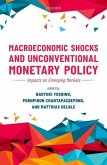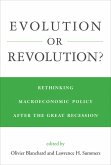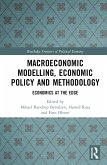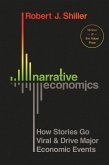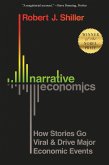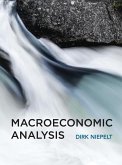Macroeconomic Policy in Fragile States
Herausgeber: Chami, Ralph; Montiel, Peter J; Espinoza, Raphael
Macroeconomic Policy in Fragile States
Herausgeber: Chami, Ralph; Montiel, Peter J; Espinoza, Raphael
- Gebundenes Buch
- Merkliste
- Auf die Merkliste
- Bewerten Bewerten
- Teilen
- Produkt teilen
- Produkterinnerung
- Produkterinnerung
Setting macroeconomic policy is especially difficult in fragile states. Macroeconomic Policy in Fragile States addresses the many issues involved and considers ways to improve the effectiveness of macroeconomic management in the face of these constraints.
Andere Kunden interessierten sich auch für
![Macroeconomic Shocks and Unconventional Monetary Policy Macroeconomic Shocks and Unconventional Monetary Policy]() Macroeconomic Shocks and Unconventional Monetary Policy162,99 €
Macroeconomic Shocks and Unconventional Monetary Policy162,99 €![Evolution or Revolution?: Rethinking Macroeconomic Policy After the Great Recession Evolution or Revolution?: Rethinking Macroeconomic Policy After the Great Recession]() Evolution or Revolution?: Rethinking Macroeconomic Policy After the Great Recession39,99 €
Evolution or Revolution?: Rethinking Macroeconomic Policy After the Great Recession39,99 €![The Great Money Bubble The Great Money Bubble]() David A. StockmanThe Great Money Bubble24,99 €
David A. StockmanThe Great Money Bubble24,99 €![Macroeconomic Modelling, Economic Policy and Methodology Macroeconomic Modelling, Economic Policy and Methodology]() Macroeconomic Modelling, Economic Policy and Methodology180,99 €
Macroeconomic Modelling, Economic Policy and Methodology180,99 €![Narrative Economics Narrative Economics]() Robert J. ShillerNarrative Economics42,99 €
Robert J. ShillerNarrative Economics42,99 €![Narrative Economics Narrative Economics]() Robert J. ShillerNarrative Economics16,99 €
Robert J. ShillerNarrative Economics16,99 €![Macroeconomic Analysis Macroeconomic Analysis]() Dirk Niepelt (Swiss National Bank Director)Macroeconomic Analysis54,99 €
Dirk Niepelt (Swiss National Bank Director)Macroeconomic Analysis54,99 €-
-
-
Setting macroeconomic policy is especially difficult in fragile states. Macroeconomic Policy in Fragile States addresses the many issues involved and considers ways to improve the effectiveness of macroeconomic management in the face of these constraints.
Hinweis: Dieser Artikel kann nur an eine deutsche Lieferadresse ausgeliefert werden.
Hinweis: Dieser Artikel kann nur an eine deutsche Lieferadresse ausgeliefert werden.
Produktdetails
- Produktdetails
- Verlag: Oxford University Press
- Seitenzahl: 688
- Erscheinungstermin: 26. März 2021
- Englisch
- Abmessung: 236mm x 163mm x 43mm
- Gewicht: 1206g
- ISBN-13: 9780198853091
- ISBN-10: 0198853092
- Artikelnr.: 60743212
- Herstellerkennzeichnung
- Libri GmbH
- Europaallee 1
- 36244 Bad Hersfeld
- gpsr@libri.de
- Verlag: Oxford University Press
- Seitenzahl: 688
- Erscheinungstermin: 26. März 2021
- Englisch
- Abmessung: 236mm x 163mm x 43mm
- Gewicht: 1206g
- ISBN-13: 9780198853091
- ISBN-10: 0198853092
- Artikelnr.: 60743212
- Herstellerkennzeichnung
- Libri GmbH
- Europaallee 1
- 36244 Bad Hersfeld
- gpsr@libri.de
Ralph Chami is currently Assistant Director in the Institute for Capacity Development, International Monetary Fund. Most recently, he was Assistant Director and Mission Chief in the Middle East and Central Asia Department (MCD) where he oversaw surveillance and program work on fragile states: Egypt, Libya, Somalia, Sudan, South Sudan, and Yemen. Previously, he was the Chief of the Regional Studies Division in MCD. He is the recipient of the 2014 IMF Operational Excellence Award. Raphael Espinoza is Deputy Division Chief at the IMF, in the Fiscal Affairs Department. He has worked on several crisis cases (Brexit, the euro crisis, IMF SBA programs, etc.) as well as in the IMF Research Department and as Lecturer and Director of the Centre for the Studies of Emerging Economies at UCL. He has written a book on the macroeconomics of the Arab States of the Gulf (OUP, 2013) and papers on international macroeconomics and finance. Peter Montiel is the Farleigh S. Dickinson Jr. '41 Professor of Economics at Williams College. He has also worked at the IMF and at the World Bank, and has served as a consultant for the African Development Bank, the Asian Development Bank, and the Inter-American Development Bank, as well as for several central banks. His research is on macroeconomic issues in developing countries. He has written several books and a number of papers in professional journals.
* 1: Ralph Chami, Mattia Coppo, Raphael Espinoza, and Peter Montiel:
Macroeconomic Policy Issues in Fragile States: A Framework
* 2: Daron Acemoglu and James A. Robinson: Building Inclusive States: A
Simple Framework
* 3: Paul Collier: Transition Programs: A Theory of the Scaffolding
Needed to Build out of Fragility
* 4: Thomas Risse: Building Governance Capacity in Areas of Limited
Statehood
* 5: Daouda Sembene: The Role of Trust in Rebuilding Countries in
Fragile and Conflict Situations
* 6: Nabila Assaf, Michael Engman, Alexandros Ragoussis, and Sarthak
Agrawal: The Private Sector in Fragile Situations
* 7: Adolfo Barajas, Ralph Chami, and Connel Fullenkamp: The State of
Finance in Fragile States
* 8: Ralph Chami, Thomas F. Cosimano, Raphael Espinoza, and Peter
Montiel: The Challenge of Macroeconomic Stabilization in Fragile
States
* 9: Timothy Besley and Hannes Mueller: Fiscal Capacity and State
Fragility
* 10: Gary Milante and Michael Woolcock: Fiscal Policy in Fragile
Situations: Flying in Fog with Limited Instrumentation
* 11: Katherine Baer, Sanjeev Gupta, Mario Mansour, and Sailendra
Pattanayak: Building Fiscal Institutions in Fragile States-A Two-Step
Approach
* 12: Warren Coats: Establishing a New Currency and Central Bank in
Fragile States
* 13: Christopher Adam and James Wilson: Monetary and Exchange Rate
Policy in Fragile States
* 14: Ibrahim Elbadawi, Raimundo Soto, and Isaac Z. Martínez: Exports,
Exchange Regimes, and Fragility
* 15: Ralph Chami, Ekkehard Ernst, Connel Fullenkamp, and Anne Oeking:
Do Financial Flows Make a Difference in Fragile States?
* 16: Francesca G. Caselli and Andrea F. Presbitero: Aid Effectiveness
in Fragile States
* 17: Charles Collyns, Kevin Kuruc, and Shinji Takagi: Assessing the
Role of the IMF in Fragile States
* 18: Ermal Hitaj, Chris Lane, Paulomi Mehta, and Rima Turk: Tailoring
IMF-Supported Programs to Fragile and Conflict-Affected States'
Needs: What Works?
* 19: Mark Griffiths, with Phil de Imus, Kareem Ismail, Gustavo
Ramirez, Robert Tchaidze, and Ramzy Al Amine: Macroeconomic Policy
Challenges in Conflict and Post-Conflict Countries: Experience and
Lessons from the Middle East
* 20: Enrique Gelbard, Giorgia Albertin, Lars Engstrom, Jose Gijon, and
Clara Mira: Exiting Fragility: The Experience of Five Sub-Saharan
African Countries
Macroeconomic Policy Issues in Fragile States: A Framework
* 2: Daron Acemoglu and James A. Robinson: Building Inclusive States: A
Simple Framework
* 3: Paul Collier: Transition Programs: A Theory of the Scaffolding
Needed to Build out of Fragility
* 4: Thomas Risse: Building Governance Capacity in Areas of Limited
Statehood
* 5: Daouda Sembene: The Role of Trust in Rebuilding Countries in
Fragile and Conflict Situations
* 6: Nabila Assaf, Michael Engman, Alexandros Ragoussis, and Sarthak
Agrawal: The Private Sector in Fragile Situations
* 7: Adolfo Barajas, Ralph Chami, and Connel Fullenkamp: The State of
Finance in Fragile States
* 8: Ralph Chami, Thomas F. Cosimano, Raphael Espinoza, and Peter
Montiel: The Challenge of Macroeconomic Stabilization in Fragile
States
* 9: Timothy Besley and Hannes Mueller: Fiscal Capacity and State
Fragility
* 10: Gary Milante and Michael Woolcock: Fiscal Policy in Fragile
Situations: Flying in Fog with Limited Instrumentation
* 11: Katherine Baer, Sanjeev Gupta, Mario Mansour, and Sailendra
Pattanayak: Building Fiscal Institutions in Fragile States-A Two-Step
Approach
* 12: Warren Coats: Establishing a New Currency and Central Bank in
Fragile States
* 13: Christopher Adam and James Wilson: Monetary and Exchange Rate
Policy in Fragile States
* 14: Ibrahim Elbadawi, Raimundo Soto, and Isaac Z. Martínez: Exports,
Exchange Regimes, and Fragility
* 15: Ralph Chami, Ekkehard Ernst, Connel Fullenkamp, and Anne Oeking:
Do Financial Flows Make a Difference in Fragile States?
* 16: Francesca G. Caselli and Andrea F. Presbitero: Aid Effectiveness
in Fragile States
* 17: Charles Collyns, Kevin Kuruc, and Shinji Takagi: Assessing the
Role of the IMF in Fragile States
* 18: Ermal Hitaj, Chris Lane, Paulomi Mehta, and Rima Turk: Tailoring
IMF-Supported Programs to Fragile and Conflict-Affected States'
Needs: What Works?
* 19: Mark Griffiths, with Phil de Imus, Kareem Ismail, Gustavo
Ramirez, Robert Tchaidze, and Ramzy Al Amine: Macroeconomic Policy
Challenges in Conflict and Post-Conflict Countries: Experience and
Lessons from the Middle East
* 20: Enrique Gelbard, Giorgia Albertin, Lars Engstrom, Jose Gijon, and
Clara Mira: Exiting Fragility: The Experience of Five Sub-Saharan
African Countries
* 1: Ralph Chami, Mattia Coppo, Raphael Espinoza, and Peter Montiel:
Macroeconomic Policy Issues in Fragile States: A Framework
* 2: Daron Acemoglu and James A. Robinson: Building Inclusive States: A
Simple Framework
* 3: Paul Collier: Transition Programs: A Theory of the Scaffolding
Needed to Build out of Fragility
* 4: Thomas Risse: Building Governance Capacity in Areas of Limited
Statehood
* 5: Daouda Sembene: The Role of Trust in Rebuilding Countries in
Fragile and Conflict Situations
* 6: Nabila Assaf, Michael Engman, Alexandros Ragoussis, and Sarthak
Agrawal: The Private Sector in Fragile Situations
* 7: Adolfo Barajas, Ralph Chami, and Connel Fullenkamp: The State of
Finance in Fragile States
* 8: Ralph Chami, Thomas F. Cosimano, Raphael Espinoza, and Peter
Montiel: The Challenge of Macroeconomic Stabilization in Fragile
States
* 9: Timothy Besley and Hannes Mueller: Fiscal Capacity and State
Fragility
* 10: Gary Milante and Michael Woolcock: Fiscal Policy in Fragile
Situations: Flying in Fog with Limited Instrumentation
* 11: Katherine Baer, Sanjeev Gupta, Mario Mansour, and Sailendra
Pattanayak: Building Fiscal Institutions in Fragile States-A Two-Step
Approach
* 12: Warren Coats: Establishing a New Currency and Central Bank in
Fragile States
* 13: Christopher Adam and James Wilson: Monetary and Exchange Rate
Policy in Fragile States
* 14: Ibrahim Elbadawi, Raimundo Soto, and Isaac Z. Martínez: Exports,
Exchange Regimes, and Fragility
* 15: Ralph Chami, Ekkehard Ernst, Connel Fullenkamp, and Anne Oeking:
Do Financial Flows Make a Difference in Fragile States?
* 16: Francesca G. Caselli and Andrea F. Presbitero: Aid Effectiveness
in Fragile States
* 17: Charles Collyns, Kevin Kuruc, and Shinji Takagi: Assessing the
Role of the IMF in Fragile States
* 18: Ermal Hitaj, Chris Lane, Paulomi Mehta, and Rima Turk: Tailoring
IMF-Supported Programs to Fragile and Conflict-Affected States'
Needs: What Works?
* 19: Mark Griffiths, with Phil de Imus, Kareem Ismail, Gustavo
Ramirez, Robert Tchaidze, and Ramzy Al Amine: Macroeconomic Policy
Challenges in Conflict and Post-Conflict Countries: Experience and
Lessons from the Middle East
* 20: Enrique Gelbard, Giorgia Albertin, Lars Engstrom, Jose Gijon, and
Clara Mira: Exiting Fragility: The Experience of Five Sub-Saharan
African Countries
Macroeconomic Policy Issues in Fragile States: A Framework
* 2: Daron Acemoglu and James A. Robinson: Building Inclusive States: A
Simple Framework
* 3: Paul Collier: Transition Programs: A Theory of the Scaffolding
Needed to Build out of Fragility
* 4: Thomas Risse: Building Governance Capacity in Areas of Limited
Statehood
* 5: Daouda Sembene: The Role of Trust in Rebuilding Countries in
Fragile and Conflict Situations
* 6: Nabila Assaf, Michael Engman, Alexandros Ragoussis, and Sarthak
Agrawal: The Private Sector in Fragile Situations
* 7: Adolfo Barajas, Ralph Chami, and Connel Fullenkamp: The State of
Finance in Fragile States
* 8: Ralph Chami, Thomas F. Cosimano, Raphael Espinoza, and Peter
Montiel: The Challenge of Macroeconomic Stabilization in Fragile
States
* 9: Timothy Besley and Hannes Mueller: Fiscal Capacity and State
Fragility
* 10: Gary Milante and Michael Woolcock: Fiscal Policy in Fragile
Situations: Flying in Fog with Limited Instrumentation
* 11: Katherine Baer, Sanjeev Gupta, Mario Mansour, and Sailendra
Pattanayak: Building Fiscal Institutions in Fragile States-A Two-Step
Approach
* 12: Warren Coats: Establishing a New Currency and Central Bank in
Fragile States
* 13: Christopher Adam and James Wilson: Monetary and Exchange Rate
Policy in Fragile States
* 14: Ibrahim Elbadawi, Raimundo Soto, and Isaac Z. Martínez: Exports,
Exchange Regimes, and Fragility
* 15: Ralph Chami, Ekkehard Ernst, Connel Fullenkamp, and Anne Oeking:
Do Financial Flows Make a Difference in Fragile States?
* 16: Francesca G. Caselli and Andrea F. Presbitero: Aid Effectiveness
in Fragile States
* 17: Charles Collyns, Kevin Kuruc, and Shinji Takagi: Assessing the
Role of the IMF in Fragile States
* 18: Ermal Hitaj, Chris Lane, Paulomi Mehta, and Rima Turk: Tailoring
IMF-Supported Programs to Fragile and Conflict-Affected States'
Needs: What Works?
* 19: Mark Griffiths, with Phil de Imus, Kareem Ismail, Gustavo
Ramirez, Robert Tchaidze, and Ramzy Al Amine: Macroeconomic Policy
Challenges in Conflict and Post-Conflict Countries: Experience and
Lessons from the Middle East
* 20: Enrique Gelbard, Giorgia Albertin, Lars Engstrom, Jose Gijon, and
Clara Mira: Exiting Fragility: The Experience of Five Sub-Saharan
African Countries


